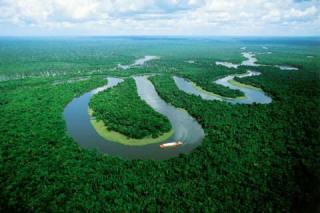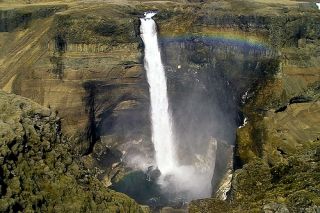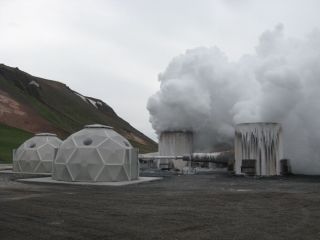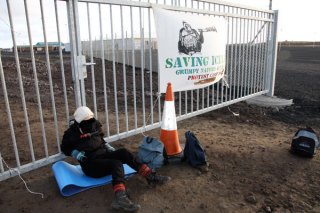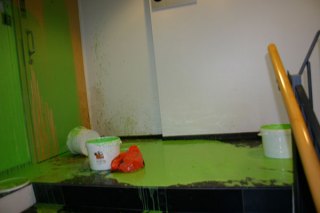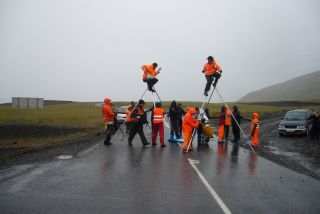'ALCOA'
Tag Archive
Dec 29 2009
ALCOA, Greenland, Kárahnjúkar, Media bias, Norsk Hydro
As Greenland awakes from over 700 years of colonisation and heavy subsidisation by Denmark, it’s home rule government are promoting the development of huge hydro-power for aluminium smelters, and all the country’s other mineral and energy resources as a desperate measure to sustain their economy. The language of fear and imminent economic collapse used in the Prime Minister’s plan (below) is strongly reminiscent of the pro heavy-industry strategy in Iceland in the run up to the Kárahnjúkar dam, and right up to today.
The article attempts to justify aluminium production and other energy intensive extractive industries, claiming that using Greenland’s ‘green’ hydro energy will prevent ‘dirty’ emissions for the inevitable production of aluminium elsewhere. This is certainly the take of Alcoa who are ever keen to avoid carbon taxes, and claim that:
‘We have before us a wonderful opportunity to deliver mutual benefit to the people of Greenland and to Alcoa as we continue to work toward our common objective of building a world-class, sustainable aluminum smelter, powered by renewable hydroelectric energy in Greenland.’
The experience of Icelandic mega-hydro, as well as numerous
studies have revealed this argument to be nothing but ‘greenwash’- a selling point for Alcoa, while carbon emissions, fluoride pollution, indigenous destruction, and weapons manufacture associated with aluminium production continue to rise unabated.
Plans for an aluminium smelter in Greenland have been reported since 2007, originally proposed by Norsk Hydro. Alcoa quickly stepped in and a Memorandum of Understanding was signed in May 2007 for a smelter in the town of Nuuk, Sisimiut or Maniitsoq. The proposed smelter will begin at 350,000 tonnes (slightly larger than the enormous Fjardaal in Iceland) and will require 650 MW of energy from 2 dams, connected to the smelter by 240 km of powerlines. Public consultations are currently in progress with the next round in January 2010, with plans to have the smelter online by 2016.
In 2008 a contact in Greenland reported that most people there are in favour of the project, and with the urgent need for financial independence as they break away from Danish rule, this may well be the case. Greenland is geographically and politically isolated and lacks even the level of critique and information which Icelanders had in the run up to Karahnjukar, let alone the support of large NGO’s for the tiny environmental group who are trying to single-handedly address the many issues with the smelters and other developments there.
Read More
Nov 17 2009
4 Comments
ALCOA, Alterra Power/Magma Energy, Amazon, Arms Industry, Bakki, Century Aluminum, Climate Change, Ecology, Economics, Geothermal Energy, Greenwash, H.S. Orka, Helguvík, Jaap Krater, Landsvirkjun, Mining, Miriam Rose, Reykjavik Energy, Rio Tinto Alcan, Saving Iceland, South Africa
By Jaap Krater and Miriam Rose
In: Abrahamsky, K. (ed.) (2010) Sparking a World-wide Energy Revolution: Social Struggles in the Transition to a Post-Petrol World. AK Press, Edinburgh. p. 319-333
Iceland is developing its hydro and geothermal resources in the context of an energy master plan, mainly to provide power for expansion of the aluminium industry. This paper tests perceptions of geothermal energy as low-carbon, renewable and environmentally benign, using Icelandic geothermal industry as a case study.
The application of geothermal energy for aluminium smelting is discussed as well as environmental and human rights record of the aluminium industry in general. Despite application of renewable energy technologies, emission of greenhouse gases by aluminium production is set to increase.
Our analysis further shows that carbon emissions of geothermal installations can approximate those of gas-powered plants. In intensely exploited reservoirs, life of boreholes is limited and reservoirs need extensive recovery time after exploitation, making geothermal exploitation at these sites not renewable in the short to medium term. Pollution and landscape impacts are extensive when geothermal technology is applied on a large scale.
Krater and Rose – Development of Iceland’s Geothermal Energy – Download as PDF
The full publication will be available from Jan. 15, 2010. ISBN 9781849350051.
Oct 13 2009
ALCOA, Bakki, Husavík Energy, Norðurþing
Aluminium giant Alcoa continues to look into the financial prospects of building an aluminium smelter at Bakki outside of Húsavík though the Icelandic government has refused to extend their Statement of Will on the subject.
Tómas Már Sigurðsson, president of Alcoa in Iceland, says the project continues in cooperation with the energy companies and the local council of Norðurþing. They are now working on getting the Environmental Impact Assessment (EIA) done, which was ordered by the ministry of environment last summer. A suggestion for the assessment was given to the Office of the Icelandic National Planning Agency at the end of September this year. Tómas Már is hoping for the results of the assessment in the spring of 2010.
Read More
Sep 20 2009
ALCOA, Amazon, Climate Change, Mining
Alcoa and Cargill have bypassed laws designed to prevent destruction of the world’s largest rain forest, Brazilian prosecutors say. The damage wrought by scores of companies is robbing the earth of its best shield against global warming.
By Michael Smith and Adriana Brasileiro
Bloomberg Markets, September 2009
For four decades, Edimar Bentes and his family have survived by farming tiny clearings in the jungle near their dirt-floor shack in the state of Para in the Brazilian Amazon. On this April afternoon, Bentes, 56, squats in the driving rain and dips a glass into what just four years ago was a crystal-clear stream that provided drinking and bathing water. He frowns as the glass fills with brown silt. A thin man with short-cropped dark hair and a tanned, deeply wrinkled forehead, Bentes gazes around his land. There are no signs of the deer, armadillos and pacas he used to hunt to feed his wife and 10 children. For Bentes and thousands of others in the Juruti region of Para whose livelihood depends on wildlife and plants, everything changed in 2006.
That’s when New York-based Alcoa Inc., the world’s second-largest primary aluminum producer, started to bulldoze a 56-kilometer (35-mile) swath of the rain forest across hundreds of families’ properties to build a railway. This cleared corridor, 100 meters (109 yards) wide, will lead to a mine that will chew up 10,500 hectares (25,900 acres) of virgin jungle over three decades. More than half of the mine will lie inside a forest that by Brazilian federal law is supposed to be preserved unharmed forever for local residents. By year’s end, Alcoa says, the railway will transport 7,000 tons a day of bauxite, the dark red ore that’s used to make aluminum, from the mine to a port on the Amazon River. Read More
Sep 16 2009
ALCOA, Bakki, Century Aluminum, Economics, Landsvirkjun, Þjórsá
By Snorri Páll Jónsson Úlfhildarson, originally published in Morgunblaðið – After last autumn’s economical collapse, the discussion about environmental issues changed rapidly. Politicians who before spoke with full force against further energy- and heavy industry projects have now completely turned around, with the premises that environmentalism is prosperity politics. The head of the Left Green party recently called the party’s environmental policy puritanical and said that it does not apply in times of economical depression. The last fortress must then be fallen – at least amongst those who believe in reforms inside the representative democracy.
Now the plan is to push through an aluminium smelter in Helguvík with all its appropriate energy construction. Svandís Svavarsdóttir, the minister of environment, recently said that there is not enough energy on the Reykjanes penisula to fulfill the smelter’s energy needs. Others have pointed out that harnessing the geothermal areas there will be such a massive attack that the areas will most likely dry up in a short time. Katrín Júlíusdóttir, the minister of industry, has stated her positive opinion about Landsvirkjun producing energy for Helguvík – and the Þjórsá river comes immadeatly up to one’s mind. She also seems to be willing to renew the memorandum of understanding between the government and Alcoa, which according to the latter’s plans means that the whole geothermal areas in north-east Iceland have to be harnessed and dams built in one or more glacial rivers. Read More
Sep 16 2009
ALCOA, Century Aluminum, Chinalco, Husavík Energy, Rio Tinto Alcan, Tungnaá, Þjórsá
Chinalco, China’s biggest aluminium producer, has shown interest in buying a 32% share in Þeistareykir ehf., a geothermal energy company from the north of Iceland, owned equally by three companies; Landsvirkun (Iceland’s national energy company), Norðurorka and Orkuveita Húsavíkur (O.H. – Húsavík Energy). Norðuorka has shown interest in selling its share and according to information from the Chinesee Embassy in Iceland a committee from Chinalco will go north to Húsavík soon to discuss with those who the purchase concerns. Alcoa and H.S. Orka, which has been bought by the Canadian H.S. Orka, have also shown interest in buying a share in Þeistareykir ehf.
Chinalco owns 10% shares in Rio Tinto-Alcan, which owns an aluminium smelter in Hafnarfjörður, Iceland. Chinalco has been focusing on buying up companies in different metal industries and e.g. recently bought copper mines in Latin America from Ross Beaty, the director of Magma Energy, a Canadian geothermal energy company that is in the process of buying big shares in an Icelandic energy company, H.S. Orka and has mentioned the possibility of buying shares in Geysir Green Energy, the major owner of H.S. Orka.
The coming 1st of October, the memorandum of understanding between Alcoa, the government and Norðurþing county, expires. Norðurþing has announced their interest in renewing their contract with Alcoa, which is still looking for ways to use the geothermal energy from Þeistareykir. Read More
Aug 12 2009
Actions, ALCOA, Century Aluminum, Helguvík, Landsvirkjun
This morning, 20 people from Saving Iceland stopped work on the Norðuál/Century’s smelter construction site in Helguvík. People locked on to three vehicle gates in to the site and therefor stopped all traffic in and out of it. People also locked on to machinery on the site so the work was stopped for at least two hours. The construction in Helguvík has to be stopped to prevent further destruction of wilderness by the damming of glacial rivers and geothermal areas, as well as the global impacts of aluminium production.
Not so long ago, the government with Össur Skarphéðinsson (then Minister of Industry) in the front, made a special discount contract with Norðurál/Century, which was signed last Friday in the shadow of Saving Iceland’s green skyr throwing. (1) The contract includes financial support from the Icelandic state in the form of a tax discount that amounts to 16,2 million US dollars. Norðurál/Century is therefor free from paying industry fees, market fees and electricity safety fees as well as special rules will apply concerning stamp duty and planning fees, and about new taxes. (2)
Read More
Aug 06 2009
Actions, ALCOA, Arms Industry, Corruption, Greenwash, Media bias, Saving Iceland
Last Tuesday, August 4th, Saving Iceland targeted the aluminium producer Alcoa. We knocked on the doors of the company’s office by Suðurlandsbraut but nobody answered, so the green skyr (traditional dairy product – historical for being used in protests) and other filthy stuff we had, ended up on the door, walls and the floor in front of the office. Compared to Alcoa’s role in the destruction of Iceland’s wilderness and other environmental and human crimes across the globe, this was a minimum punishment.
Though Alcoa’s aluminium smelter in Reyðarfjörður (east of Iceland) is now working with full force, driven on by the highly critical Kárahnjúkar Dam, there is still a fair reason for attacking the company. The smelter in Reyðarfjörður was the beginning of the heavy industry madness, the first sign of how effect the government’s advertisement campaign about the country’s cheap energy and people’s little as no resistance, was. (1) The smelter in Reyðarfjörður was the ball the pushed forward the idea that aluminium production is the premise for life. After the construction of the Kárahnjúkar Dam, all other energy projects look so small that only very few people seem to see a reason for fighting against them. And the police’s mistreatment towards those who dared to put their feet in between the construction, did for sure not encourage many to continue the resistance. Read More
Jul 29 2009
ALCOA, Andri Snaer Magnason, Century Aluminum, Economics, Landsvirkjun, Saving Iceland, Þjórsá
Shortly after the news about how Saving Iceland closed the offices of institutions and companies involved in the heavy industrialization of Iceland, Katrín Júlíusdóttir, the Minister of Industry said that she had not been able to study the message of Saving Iceland. She said that she had not received a written report from the group and not decided to contact it, but said that she takes a look at all factual comments that she receives. (1)
This is a typical answer for a politician or a corporation’s worker when his/her job is criticized. It is impossible to keep track of how many times Saving Iceland has been offered to sit down and chat with the spokespersons of companies like Landsvirkjun (Iceland’s national energy company) and political parties’ representatives. The purpose with these invitations to meetings is of course only to create a positive image of the corporation or the institution and give the idea that conversation and information are necessary parts of the business. When Saving Iceland has refused these offers, the movement has been stamped as non-factual and with a lack of knowledge, e.g. last summer when Landsvirkjun’s director, Friðrik Sophusson said the Saving Iceland was only asking for attention by acting like clowns. (2)
Katrín Júlíusdóttir knows just as well as Friðrik Sophusson what Saving Iceland’s message and aims are, and thus does not have to ask herself why the group did not wish to meet up with her. Environmentalists in Iceland – including Saving Iceland – have for years explained their resistance towards the heavy industrialization of Iceland with powerful information campaigns, publishing magazines and pamphlets, keeping up websites etc. etc. Most of Saving Iceland’s actions have been followed up with comprehensive press releases, including inconvenient facts about the companies that have to do with the heavy industrialization and information about the serious effects of aluminium production. These press releases have e.g. lead to the fact that the media coverage about the issue has widened. An example of that is the media coverage on the effects of bauxite mining and the aluminium companies’ connection and co-operation with arms producers and war institutions. (3) Read More
May 10 2009
ALCOA, Andri Snaer Magnason, Corruption, Economics, Landsvirkjun, Saving Iceland
Given the chance, we’d have made it into Murmansk
From The Reykjavík Grapvine – Dreamland is the result of collaboration between documentary filmmaker Þorfinnur Guðnason and author, playwright and poet Andri Snær Magnason. It is based on the latter’s best selling, award winning 2006 non-fiction book, ‘Dreamland: A self-help manual for a Frightened Nation’ (available in English translation through Amazon.co.uk and at local bookstores). The book stirred a lot of controversy in Iceland, as it shed new light on some of the issues surrounding the conflict between environmental preservation and the build up of heavy industry in Iceland. It furthermore examined the government’s hope to sell cheap energy from hydroelectric power plants in order to place Iceland among the world’s biggest aluminium manufacturers – and why on Earth we’d aspire to that.
The film goes even further, using the full potential of the medium to conjure up a truly chilling vision of recent events. And it’s effective. As we exited a screening of the film, my friend Geiri summarised the experience perfectly, saying: “Most of the time, I didn’t know whether to laugh, cry or vomit in disgust.” That somehow says it all. A scathing indictment of Iceland’s recent “all in” industrial and environmental policies, Dreamland combines archival news footage, exquisite nature shots and select interviews to achieve its goal of waking Icelanders up to the very real, very serious consequences of selling off some of the last bits of pristine wilderness remaining in Europe. Read More

